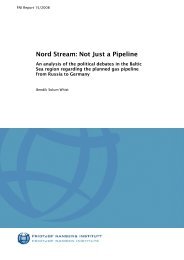SAIIA SOUTH AFRICAN DIPLOMATS ABROAD.pdf
SAIIA SOUTH AFRICAN DIPLOMATS ABROAD.pdf
SAIIA SOUTH AFRICAN DIPLOMATS ABROAD.pdf
You also want an ePaper? Increase the reach of your titles
YUMPU automatically turns print PDFs into web optimized ePapers that Google loves.
office seems to have been well run, with less than half a dozen<br />
clerks to attend to the whole of the country's affairs. To-day<br />
there are over a hundred.<br />
By the beginning of the nineteenth century Katal and British ^<br />
Kaffraria had come into being and opened small establishments of<br />
their own. In 1854 the Cape Parliament was established and<br />
the colony was expected to open an "Agent-General's Office"<br />
like that of other colonies to mark the improvement in its status.<br />
The Government, however, liked the economical regime of<br />
Messrs. Barnard and Bailey and for years made no change.<br />
At last, in 1859, Mr. W. C. Sergeant, who had had been<br />
Lieutenant-Govemor of Natal, became Agent-General jointly<br />
with Mr. Penrose G. Julyan. Soon after the clerks ceased to<br />
have the office at Spring Gardens to themselves. Engineers,<br />
particularly specialists in railways and telegraphs joined the<br />
staff. One of these was MrT^later Sir) William Preece, one of<br />
the pioneers of radio. f<br />
Early in the eighteen-seventies the Cape moved its London<br />
headquarters to No. 7 Victoria Street, Westminster, a far more<br />
respectable neighbourhood than Spring Gardens. Recruiting<br />
for the famous Cape Mounted Rifles was carried on here.<br />
Downing Street appointed Mr. (later Sir) Montague Ommaney,<br />
late of the Royal Engineers, together with Mr. E. E. Blake to<br />
handle the affairs of minor colonies including Natal.<br />
The staffs were still on a very modest scale. In 1885, when<br />
the Cape Office was at Albert Mansions, the establishment<br />
comprised the Agent-General, Captain (later Sir) Charles Mills,<br />
who received £1,200 yearly, and four clerks. Even at this stage<br />
visitors to London groused in the colonial press about the<br />
"six months old newspapers" and the "officials who try to keep<br />
their empty heads".<br />
Under Sir Charles Mills there was a further trek to 46,<br />
Victoria Street, and then to 112. All the colonies seemed to<br />
crowd together there. New Zealand and the several states of<br />
Canada and Australia, Natal and even the independent Transvaal<br />
and Orange Free State all had their offices at No. 72 or 121.<br />
After the Act of Union Mr. W. P. Schreiner was appointed<br />













